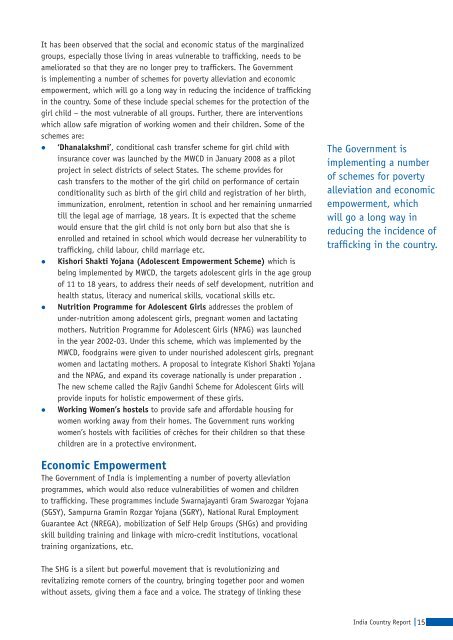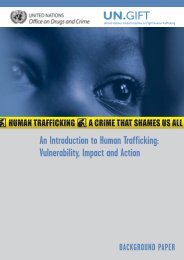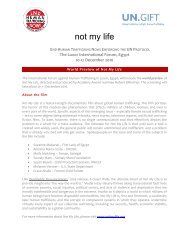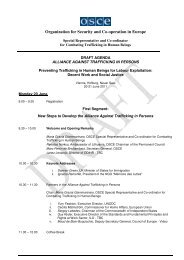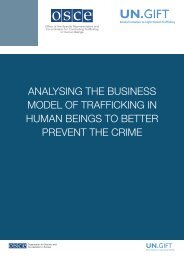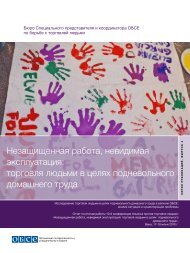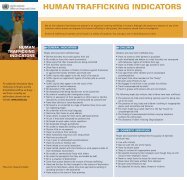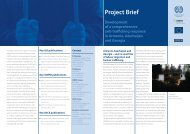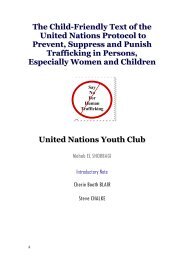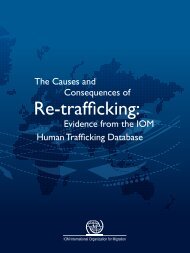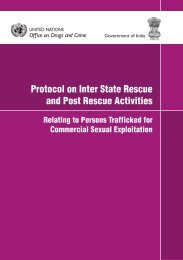India Country Report - United Nations Office on Drugs and Crime
India Country Report - United Nations Office on Drugs and Crime
India Country Report - United Nations Office on Drugs and Crime
Create successful ePaper yourself
Turn your PDF publications into a flip-book with our unique Google optimized e-Paper software.
It has been observed that the social <strong>and</strong> ec<strong>on</strong>omic status of the marginalized<br />
groups, especially those living in areas vulnerable to trafficking, needs to be<br />
ameliorated so that they are no l<strong>on</strong>ger prey to traffickers. The Government<br />
is implementing a number of schemes for poverty alleviati<strong>on</strong> <strong>and</strong> ec<strong>on</strong>omic<br />
empowerment, which will go a l<strong>on</strong>g way in reducing the incidence of trafficking<br />
in the country. Some of these include special schemes for the protecti<strong>on</strong> of the<br />
girl child – the most vulnerable of all groups. Further, there are interventi<strong>on</strong>s<br />
which allow safe migrati<strong>on</strong> of working women <strong>and</strong> their children. Some of the<br />
schemes are:<br />
‘Dhanalakshmi’, c<strong>on</strong>diti<strong>on</strong>al cash transfer scheme for girl child with<br />
insurance cover was launched by the MWCD in January 2008 as a pilot<br />
project in select districts of select States. The scheme provides for<br />
cash transfers to the mother of the girl child <strong>on</strong> performance of certain<br />
c<strong>on</strong>diti<strong>on</strong>ality such as birth of the girl child <strong>and</strong> registrati<strong>on</strong> of her birth,<br />
immunizati<strong>on</strong>, enrolment, retenti<strong>on</strong> in school <strong>and</strong> her remaining unmarried<br />
till the legal age of marriage, 18 years. It is expected that the scheme<br />
would ensure that the girl child is not <strong>on</strong>ly born but also that she is<br />
enrolled <strong>and</strong> retained in school which would decrease her vulnerability to<br />
trafficking, child labour, child marriage etc.<br />
Kishori Shakti Yojana (Adolescent Empowerment Scheme) which is<br />
being implemented by MWCD, the targets adolescent girls in the age group<br />
of 11 to 18 years, to address their needs of self development, nutriti<strong>on</strong> <strong>and</strong><br />
health status, literacy <strong>and</strong> numerical skills, vocati<strong>on</strong>al skills etc.<br />
Nutriti<strong>on</strong> Programme for Adolescent Girls addresses the problem of<br />
under-nutriti<strong>on</strong> am<strong>on</strong>g adolescent girls, pregnant women <strong>and</strong> lactating<br />
mothers. Nutriti<strong>on</strong> Programme for Adolescent Girls (NPAG) was launched<br />
in the year 2002-03. Under this scheme, which was implemented by the<br />
MWCD, foodgrains were given to under nourished adolescent girls, pregnant<br />
women <strong>and</strong> lactating mothers. A proposal to integrate Kishori Shakti Yojana<br />
<strong>and</strong> the NPAG, <strong>and</strong> exp<strong>and</strong> its coverage nati<strong>on</strong>ally is under preparati<strong>on</strong> .<br />
The new scheme called the Rajiv G<strong>and</strong>hi Scheme for Adolescent Girls will<br />
provide inputs for holistic empowerment of these girls.<br />
Working Women’s hostels to provide safe <strong>and</strong> affordable housing for<br />
women working away from their homes. The Government runs working<br />
women’s hostels with facilities of crèches for their children so that these<br />
children are in a protective envir<strong>on</strong>ment.<br />
The Government is<br />
implementing a number<br />
of schemes for poverty<br />
alleviati<strong>on</strong> <strong>and</strong> ec<strong>on</strong>omic<br />
empowerment, which<br />
will go a l<strong>on</strong>g way in<br />
reducing the incidence of<br />
trafficking in the country.<br />
Ec<strong>on</strong>omic Empowerment<br />
The Government of <str<strong>on</strong>g>India</str<strong>on</strong>g> is implementing a number of poverty alleviati<strong>on</strong><br />
programmes, which would also reduce vulnerabilities of women <strong>and</strong> children<br />
to trafficking. These programmes include Swarnajayanti Gram Swarozgar Yojana<br />
(SGSY), Sampurna Gramin Rozgar Yojana (SGRY), Nati<strong>on</strong>al Rural Employment<br />
Guarantee Act (NREGA), mobilizati<strong>on</strong> of Self Help Groups (SHGs) <strong>and</strong> providing<br />
skill building training <strong>and</strong> linkage with micro-credit instituti<strong>on</strong>s, vocati<strong>on</strong>al<br />
training organizati<strong>on</strong>s, etc.<br />
The SHG is a silent but powerful movement that is revoluti<strong>on</strong>izing <strong>and</strong><br />
revitalizing remote corners of the country, bringing together poor <strong>and</strong> women<br />
without assets, giving them a face <strong>and</strong> a voice. The strategy of linking these<br />
<str<strong>on</strong>g>India</str<strong>on</strong>g> <str<strong>on</strong>g>Country</str<strong>on</strong>g> <str<strong>on</strong>g>Report</str<strong>on</strong>g><br />
15


